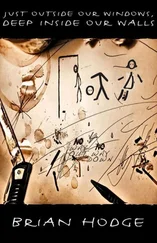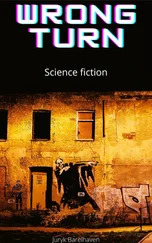He scoured his two colleagues' faces for signs of suspicion. If they had noticed what had happened, he could expect to be arrested that night, his office sealed, staff sent away, files seized, house raided. But the two men hardly looked up. His pounding heartbeat became more sedate. Either they were Kenya's most consummate actors, or they had barely noticed that he had left the room, let alone picked up the whisper emanating from his chest. Cautiously, he resumed his seat. Leaned forward to include himself in the conversation. The recorder was running again. That night he would do what had become a daily chore, summarising the evening's conversation in one of his black Moleskine notebooks, downloading the disc's contents onto his computer, emailing the file in codified form to a friend abroad. Another piece of evidence collected and logged, his insurance against the coming storm. It would all mount up.
Outside, Uhuru Park, Harambee Avenue and the Kenyatta International Conference Centre had all been swallowed up by the darkening sky. Sunset does not last long this close to the equator. The once-busy streets were barely illuminated by the few functioning street lamps, whose dull glow drove the insects crazy but scarcely penetrated the deep African night. They now looked empty and dangerous, delivered over to the city's rapists and thieves. Distant traffic, working its way through the suburbs and outlying slums, gave off a quiet, murmuring rumble. It smelt as though rain was on its way.
‘It was an amazing thing, for one moment in a hundred years, to all feel the same way. And to feel that it was good.’
Kenyan writer BINYAVANGA WAINANA
A brown clod of earth, trailing tufts of grass like a green scalp, suddenly soared through the air and landed on the stage, thrown by someone high on the surrounding slopes. Then another one sailed overhead, this time falling short and hitting the journalists packed against the podium. Then came some sticks, a hail of small stones. The first rows of the crowd hunched their shoulders and hoped it would get no worse: there were plenty of kids up there from Kibera slum, the sprawl of rusty shacks that stretched like an itchy brown sore across the modern city landscape, and they had a nasty habit of using their own excrement as missiles. The mood in the open-air stadium in Uhuru Park on 30 December 2002, a year and a half before that strange meeting in the finance ministry, was on the brink of turning ugly. Mostly male, mostly young, the audience was getting bored with waiting.
For much of the morning the mood had been cheerful. The thousands of Kenyans who had begun streaming into the amphitheatre at 7 a.m. for the presidential inauguration – the first change of leadership via the ballot box since independence – had every reason to pat themselves on the back. With the simplest of acts, they had pulled off what felt like a miracle. They had queued patiently for hours in the sun, cast their ballots and in the process turned their backs on the retiring Daniel arap Moi, twenty-four years at the helm, the president credited with reducing East Africa's most prosperous economy to ‘ nchi ya kitu kidogo ’: ‘land of the “little something”’, homeland of the bribe. Campaigning on an issue that infuriated the public – the corruption souring every aspect of their lives – the opposition had united under the banner of the National Rainbow Coalition (NARC) and stomped to victory. It had told the electorate it was ‘ unbwogable ’ – uncrushable – and this had proved no idle boast, for it had broken the ruling KANU party's thirty-nine-year grip on power.
It seemed as though Kenya's political parties had finally matured, realising that so long as they allowed tribal differences to dominate, with each ethnic group mustering behind its own presidential candidate, Moi would win. In contrast with so many of his African counterparts, the loser – Moi's handpicked protégé Uhuru Kenyatta, son of the nation's founding father – had gracefully accepted the results. In the slum estates the night before, many had braced themselves for a military takeover, reasoning that Moi's security services would surely not meekly accept the people's verdict. They had been proved wrong, and the fact that power was about to change hands peacefully in an African nation, rather than at the barrel of a gun, was hailed by the Western press as a tribute to both the rule of law and a politically mature public's self-control. The partying had gone on into the early hours, with Tusker beer washing down roasted chicken. When it became clear which way the vote was going, residents had rounded up all the local cockerels and slaughtered the ‘ jogoo ’, hated symbol of the once-proud KANU, which Moi had promised would rule the country for a hundred years. This morning they were turning up to bear living witness to their own historic handiwork.
Up on the dais, an array of African presidents and generals in gold brocade and ribbons sat fanning themselves. Next to them sweltered the diplomats, ham-pink under their panamas. Kenyan VIPs, finding no seats available, sat uncomplaining on the floor, their wives' glossy wraps trailing in the dust. As the timetable slipped by two, then three, four, five hours, the amphitheatre steadily filled. An incongruous aroma of Sunday lunch wafted through the air as thousands of feet crushed the wild garlic growing on the slopes. Nearby trees sagged under the weight of street boys seeking a bird's eye view. An urchin on the rooftop of the podium wiggled his ragged arse to the music from the military band, which, like all the armed forces present, was beginning to lose its nerve. They had rehearsed exhaustively for this event, but had never anticipated these kind of numbers: 300,000? 500,000? Who could count that sea of brown heads? At the start, police horses had plunged and reared as the General Service Unit (GSU), Kenya's dreaded paramilitary elite, attempted to clear the area in front of the dais. They had pushed the crowd back, only for policemen posted on the fringes to push it forward. But as the throng grew, and grew, and grew, the men from the GSU dismounted and quietly joined the onlookers, aware that the best they could hope for now was avoiding a stampede.
Gathered at the front, we journalists had long ago lost our carefully chosen perches and jealously cherished camera angles, swallowed up by the crowd pressing hard at our backs. Pinned against my neighbours, I could feel small hands, fleeting as lizards, fluttering lightly through my pockets in search of money, mobile, wallet. With a heave, I scrambled onto a creaking table where a dozen sweaty photographers and reporters teetered, bitching fretfully at one another – ‘Don't move!’ ‘Hey, head down, you're blocking my shot!’ ‘Stop pushing!’ – a touch of hysteria – ‘STOP PUSHING!’ The ceremony was now running six hours late. Rather than whipping up the audience, newly elected MPs were appealing for calm from the stage. A Kenyan reporter next to me rolled the whites of her eyes skywards, gracefully fainted and was passed out over people's heads in the crucifix position, like a fan at a rock concert. I wondered how long it would be before I followed her. People were keeling over left, right and centre, ambulance crews plunging bravely into the throng to remove the wilting bodies.
Finally, amid cheeky cries of ‘Speed up! Speed up!’, accompanied by ‘fast-forward’ gestures from the crowd, the ceremony started. An aide walked on bearing a gold-embroidered leather pouffe. This, it turned out, was the Presidential Pouffe, there to prop up the plastered leg of winner Mwai Kibaki, who had survived the years in opposition only to be nearly killed in a campaign car crash. Next came Kibaki himself, his wheelchair carried by eight straining men. The ramp they laboured up had been the topic of a debate which exposed the establishment's nervousness. Frightened of being implicated, at even the most pragmatic level, in this near-inconceivable changing of the guard, jittery officials from the ministry of public works had refused to build the cement slope required, forcing an exasperated army commander to contract the work out to a private firm.
Читать дальше












